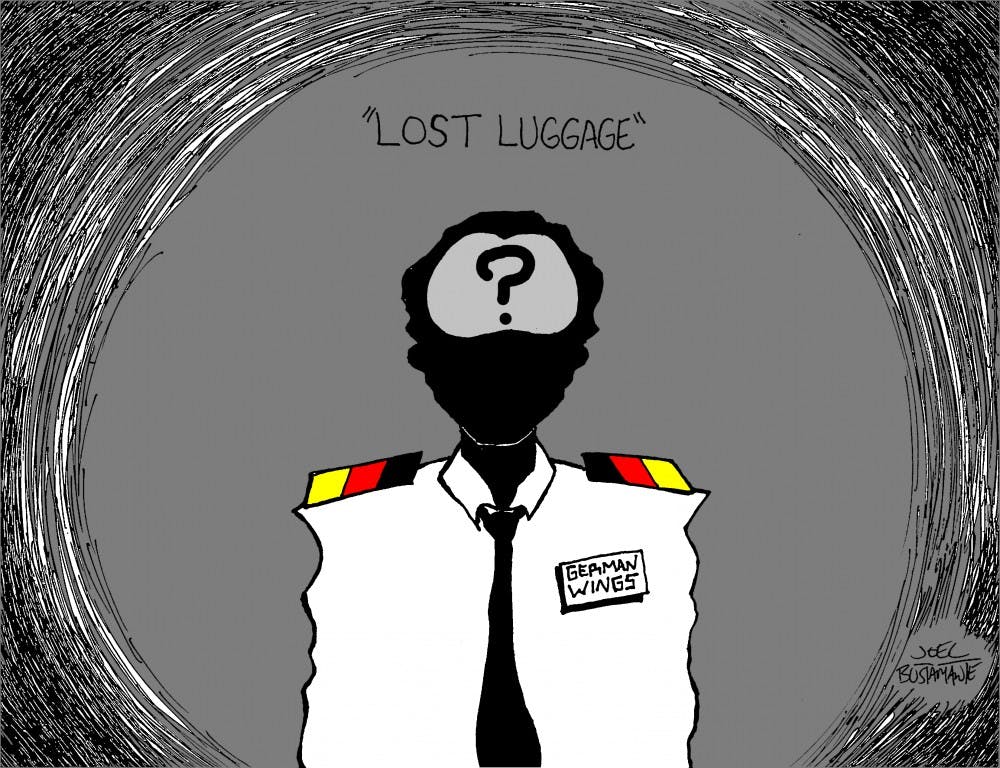Sometimes there’s no explanation as to why bad things happen to good people. Unfortunately, this is not the case for Germanwings flight 9525.
Reports have confirmed Andreas Lubitz had reported his depression to the parent company of Germanwings, Lufthansa, many years prior to the crash in the French Alps.
An unstable state of mind can lead to a traumatic ending, especially if that mind is co-piloting a vehicle full of 144 passengers and six crew ?members. Still, it’s hard not to wonder if there was some sort of malintent ?backing Lubitz’s decisions on March 24.
No, he’s not a terrorist; this act wasn’t a political tool. But can we blame it all on depression? At what point do we draw the line? The line is drawn when one puts others’ lives in danger. So many fathers, mothers, sons and daughters were lost at the stake of one ?individual’s mental illness.
Lubitz essentially conducted a mass shooting without having to do the dirty work. This illness is no excuse for consciously locking the pilot in charge out of the cockpit.
The cockpit voice recorder clearly indicates the pilot banging on the door trying to re-enter. Lubitz never responded. Passengers started to scream prior to impact as they were plummeting toward their deaths.
This crash is an example of how deep depression can run through someone’s veins. Before completing his flight training, Lubitz submitted medical documents that clearly ?indicate he was previously suicidal.
This is unacceptable. There are some high-risk professions that cannot include individuals with this kind of ?medical history.
Yes, it might seem unfair or prejudiced against those who suffer from a mental illness. But in reality, it’s protecting those lives that could be lost at the stake of an individual’s ?instability. It’s a tough choice to reject others for having an “issue.” But as a society we need to recognize how to work with those suffering or who have suffered. There are so many other opportunities and careers that wouldn’t impose danger on innocent citizens.
In turn, this heavily stigmatizes mental illness. This shouldn’t happen either. We need to ensure safety but also make it comfortable for individuals to seek treatment when necessary.
Being honest about a mental health problem is far easier said than done. A simpler route is to go undetected through a high-risk profession.
People don’t like to be seen as “different” or at a disadvantage, which is ?exactly what individuals fear when coming out with a psychiatric issue.
The reality is the alternative involves a dangerous scenario which could result in the death of the ?individual as well as others. Ensuring everyone’s safety is a dicey business. Companies can’t read the minds of their employees, and people slip through the cracks.
Reporting a mental illness shouldn’t be something to be feared. Seeking help by recognizing a problem is one of the most courageous acts a person can do.
It’s difficult and confusing, but we need to prevent these unfortunate events from happening.
Recognizing this, we also need to realize this crash was not completely dependent on Lubitz’s depression. There are plenty of other factors that could have contributed to his ?decision to crash the plane.
According to the New York Times, the sound of Lubitz’s breathing indicated he was conscious until the ?fatal end.
It appeared that he had the intent to destroy the aircraft, further suggesting he had a hint of homicidal ?tendency.
Individuals commit suicide themselves; they don’t bring 150 other ?people down with them.




